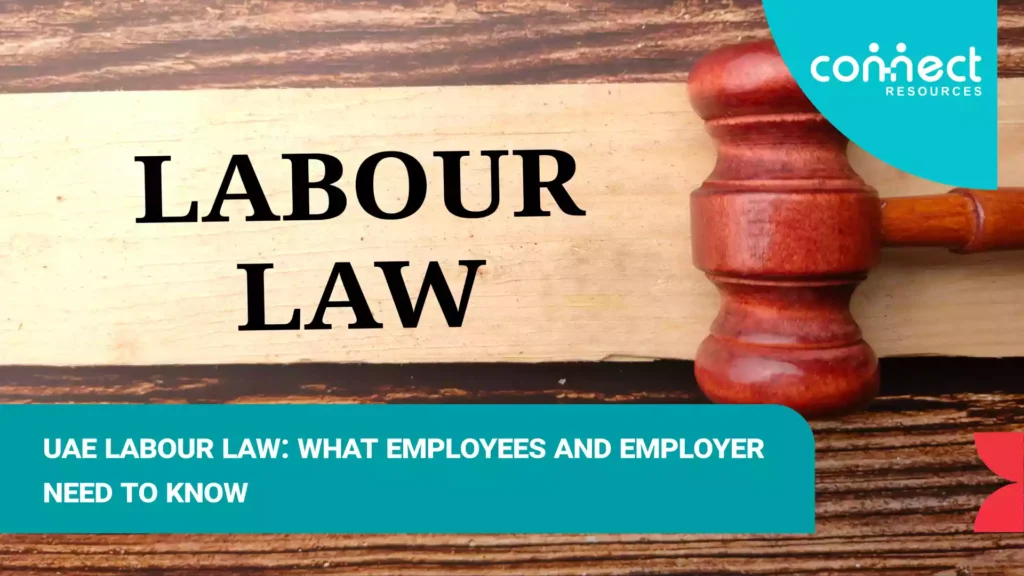Businesses in the United Arab Emirates have a lengthy to-do list for complying with employment legislation and HR regulations at the beginning of 2024. Consequently, if you do not know yet, you must learn about all the changes that are now in place regarding the UAE labour law. As a result, you will be able to implement them and abide by them.
In 2022, the labor law was modified by the UAE government. Many of the changes became enforceable in 2024. The most recent amendment reinforced anti-discrimination legislation and clarified employer responsibilities. In addition, the law mandated that all employment contracts be fixed-term and modified the duration of some leaves.
In this article, we will be talking about the new changes on the UAE labour law. These consist of brand-new employment opportunities, contracts and work models that are more adaptable, employee protection, and more. You will understand the advantages of these remarkable recent changes once you are aware of them. Let us look!
Benefits of UAE Labour law

Employee benefits are extra perks offered to the staff of a company over and above their fixed compensation or wage. These perks may come in the form of either financial or other elements that raise the overall pay that employees get. The following are a few typical instances of employee benefits:
- Employees’ provident fund.
- Employee health insurance.
- Paid leaves.
- Statutory leaves.
- Maternity and paternity leaves.
- Allowances, such as transportation allowance.
- Gratuity.
- Compensation for internet and phone bills, etc.
Both nationals and foreigners are eligible for employment remuneration and perks in the United Arab Emirates. All required employee benefits are granted to every employee in the nation, with the exception of a few particular advantages that are only available to UAE nationals.
Employer-employee interactions in the private sector are governed by Federal Decree legislation No. 33 of 2021 Regarding the Regulation of Employment Relationship and its revisions, also referred to as the “UAE Labour law.” All private sector companies, workers, and employers are subject to the law’s rules.
According to the labour law uae, the benefits are:
- Minimum wage: There is no obligatory global minimum wage or pay for expats in the UAE. The minimum pay and salary for UAE nationals is now depending on their level of education.
- Working hours: In the private sector, the standard workweek consists of 48 hours, or 8 hours every day. School and university workweeks are four-hour days for public sector personnel. If employment takes more than five hours, employees have the right to one or more breaks during working hours. There is no calculation of these breaks as working time.
- Overtime: Extra hours go on a rate of 125%. However, if it is between 10 pm to 4 am and off-days, it will go at a 150% rate.
- Leaves: These include, sick leave, maternity leave, paternity leave, pilgrimage leave, compassionate leave, study leave.
- Severance payment: Employees with over 5 years of employment will receive a month of wages.
- Insurance: Staff members and their families must receive health insurance when working in the UAE.
Fixed term contracts
The New Law eliminates the idea of limitless term contracts and allows only fixed term contracts (with a maximum duration of three years) to be issued. By 2 February 2023, employers must convert all present employees with indefinite duration agreements to fixed term contracts.
Due to its length, a limited contract is often referred to as a fixed-term contract. The period of the limited contract will typically match that of the UAE residency visa that an expat asks for.
The contract may therefore be in effect for a period of 2 or 3 years, as that is the most typical duration. Both parties must agree on contract renewal if they want the work relationship to continue.
However, if the employee decides they do not wish to continue, they must give the employer a letter of non-renewal. This will let the employer know that a renewal is not essential.
You can see that the main difference between a UAE restricted and a limitless agreement is that the former has a fixed time and the later is variable.
According to UAE Labour Law, a limited term employment contract must at the very least contain the following details:
- Expiration date.
- Start date.
- Type of work.
- Location of work.
- Amount of compensation.
- Time period.
Probation period notice
In the UAE, a probationary term is mandatory of all new hires. The duration of the probationary term may be between three and six months, subject to the company’s specific policies. If you are planning to submit an application for labor in Dubai, Abu Dhabi, or one of the other emirates, here is everything you need to know about the trial period in the United Arab Emirates.
Before appointing a worker to a permanent post in the United Arab Emirates, their performance undergoes evaluation during a probationary period. The worker is subject to a rigorous review and performance evaluation while they are on probation.
After the review, if the applicant is found to be qualified for the particular role, the company will retain them as a permanent employee.
The UAE MOHRE has been working on many regulations for the probationary term for employees in the nation:
- Probationary employees have the right to at least fourteen days’ notice before having their employment terminated.
- If a probationary employee intends to leave the United Arab Emirates, they must provide the firm at least 14 days’ notice. A month’s notice is necessary, however, if an employee wants to start working for another UAE company.
According to Article 31 (2) of Federal Decree-Law No. (33) of 2021 controlling the regulation of work relationships, the worker has no entitlement to use earned sick leave during the probationary period in the United Arab Emirates. However, in the UAE, the employer may give the worker unpaid sick days if a medical facility’s evaluation supports it.
A worker in the UAE who is in their time on probation has no right to any gratuities. This in accordance with the laws and rules of the UAE Labour Law. Extending the probationary period is against the law, especially if the person meets the company’s performance.
Termination of employment
Despite the term “fixed,” the New Law allows fixed term contracts to be dissolved on notice at any time throughout the term for a “legitimate reason.” This, so long as the necessary quantity of notice in writing under the employment contract is given. It is now acceptable to terminate an employee with warning for grounds other than those relating to performance or behavior.
The concept of redundancies is now specifically a legitimate ground for termination. Only if the company is insolvent or bankrupt, or if there are any financial or extraordinary circumstances. This is perhaps most notable.
Additionally, the old law’s unfair dismissal compensation regime is less, with compensation now only possibly accessible for staff in two specific situations of termination. However, it should be noted that it is still unclear how the UAE Labour Courts will apply the new law.
The employee has the right to “early termination pay” of at least 3 months’ pay in accordance with UAE Labor Law. if the employer wishes to terminate the Agreement prior to the expiration of the Limited Term, including income and a Limited Agreement Gratuity (or the balance of the Limited Term if there are less than 3 months remaining in the Limited Term). This compensation is simple to obtain with the aid of a professional employer organization.
On the other hand, employees have the choice to cancel the contract. Unless the employment contract specifies otherwise, the employee needs, by law, to give the employer “early severance compensation” in the amount of half of 3 months’ worth of wages. This includes, for a limited period of time, salary and bonuses, or, if the deal has less than three months left to run, half of the residual compensation.
New rules and regulations in the private sector
The UAE Cabinet amended the UAE labour law private sector in February 2022 with a number of new regulations. These revised legislation, which the government originally outlined and published in November 2021, have a crucial goal. As they increase worker rights, they will make numerous things available that were not before.
On the other hand, you must be aware that the new adjustments will alter how the private sector handles employment. For instance, the new UAE Labour Law would introduce shorter, fixed-term contracts as well as cooperative duties and flexible working hours. Additionally, workers in the private sector will now be able to remain in the region for 180 days after quitting their jobs.
In the case of work sharing, these arrangements were in place to accommodate college students and workers making a career change. But, in addition to all of these modifications and additions, the UAE labour law 2024 also contains significant adjustments related to leave. If you have employment in the UAE and this concerns you, for instance, maternity leave regulations will have new revisions that you should be aware of.
However, if you are the proprietor of a private company in the nation, you must inform your staff members of these changes. UAE government authorities have stated that owners of private sector businesses must strictly abide by the new regulations to avoid serious legal repercussions, such as penalties and fines for infractions, which can be expensive in most circumstances.
The new UAE Labour Law’s prohibition of prejudice in any manner, including against people based on their sex, race, ethnicity, faith, socioeconomic background, nationality, or disability, is another significant feature. Additionally, the new laws will give employees better protection from harassment.
No reduction or forfeiture of gratuity
End-of-service gratuities for former employees who left their jobs before accumulating 5 years of service are either decreased (for contracts with unlimited terms) or forfeited (for contracts with set terms). A summary dismissal also resulted in the loss of a gratuity for the employee. These are no longer applicable under the New Law, and regardless of the reason for termination, an employee now has the right to their gratuity at the conclusion of their work.
Medical Insurance
The Dubai Health Authority (DHA) issued a law in 2023 requiring health insurance for everyone who lives in Dubai. More specifically, Dubai Health Insurance Law (DHIL), also known as Law No.11 of 2013 Regarding Health Insurance in Dubai, made health insurance essential.
According to the law, businesses or visa sponsors must offer their employees or visa sponsors health insurance protection with the minimum benefits mandated by DHA.
It is significant to highlight that since health insurance is not compulsory in Dubai, the employer may or may not offer it to the employee’s family.
The following is also in Article 11:
- The expense of health insurance should be covered by the employer; it cannot be deducted from an employee’s pay.
- Give the employee the health insurance card.
- Consider the employee’s fees for urgent treatment and medical attention.
Recruitment and employment contracts
Every employee must have a fixed-term employment contract that is no more than three years. Renewals of contracts are permissible, and they count toward the overall length of service. By 1 February 2023, all contracts must have been converted to fixed-term agreements.
The MOHRE/free zone contract is still necessary. However, the MOHRE template contract can now see modifications. Therefore, several forms are available according to the type of visa or work arrangement.
When recruiting, the new UAE labour law permits a wide variety of unique employment contract types. You must be aware of the following categories of contracts:
- Limited.
- Unlimited.
- Full-time.
- Part-time.
- Job-sharing.
- Contract and temporary staff.
It’s crucial to comprehend how each type of contract can affect your ability to operate legally in the UAE. Additionally, in order to work in the UAE for any type of profession, you must have a work visa and other types of permits.
Understanding the changes in the UAE labour law private sector is crucial for employers and employees alike. Consequently, if you are an employer in the UAE, it is ideal for you to have an advisory company by your side to help you keep your compliance. If that is the case, Connect Resources is here for you!
With us, you can obtain the HR services you need to abide by this new UAE labour law. As a result, you will be able to provide your team with all the new UAE labour law benefits! Make the most out of what we have to offer and write us at contact@connectresources.ae. Also, you can give us a call at +971 43 316 688.









